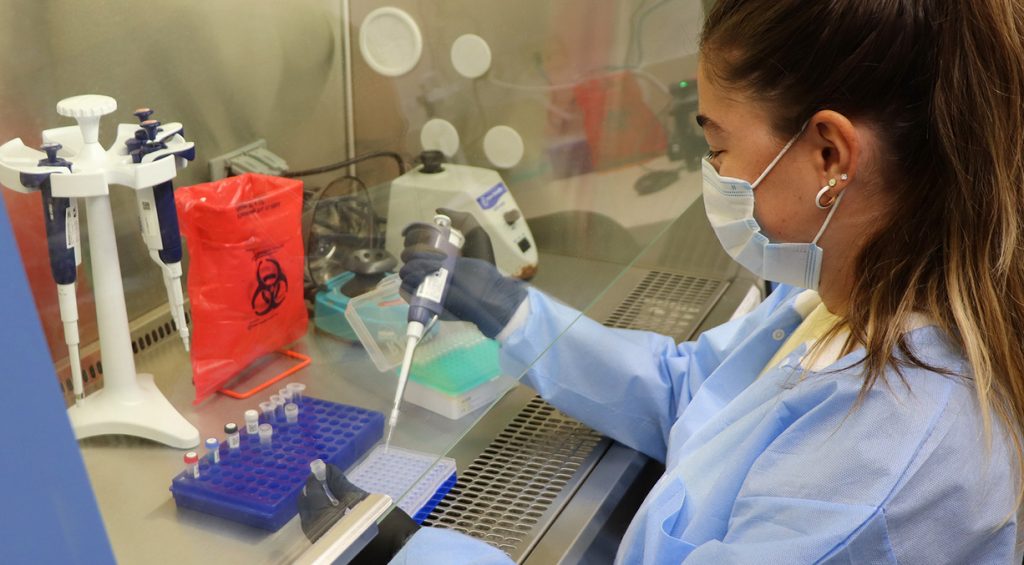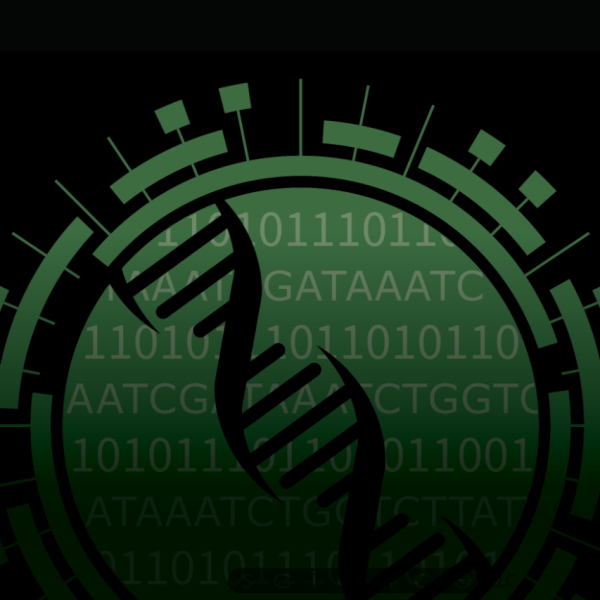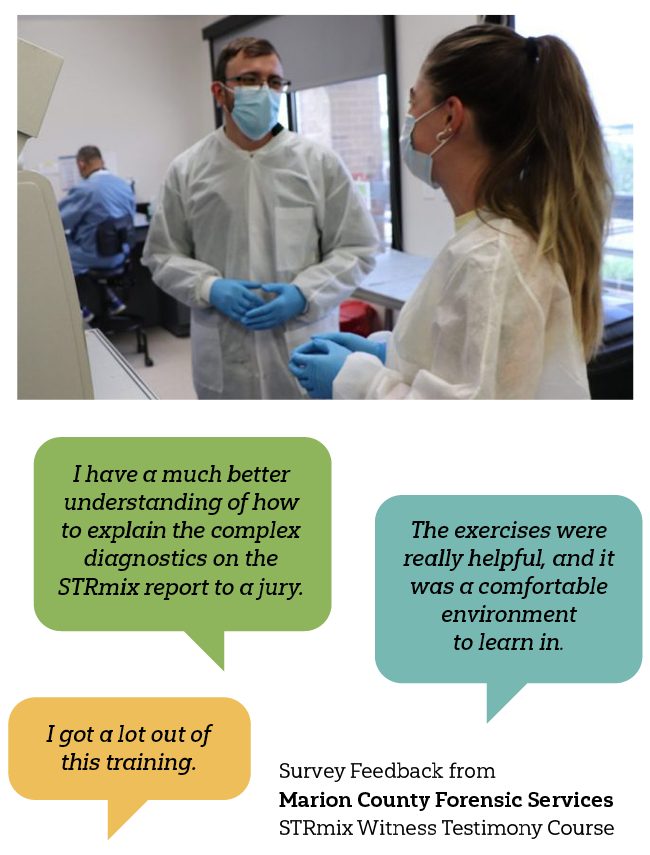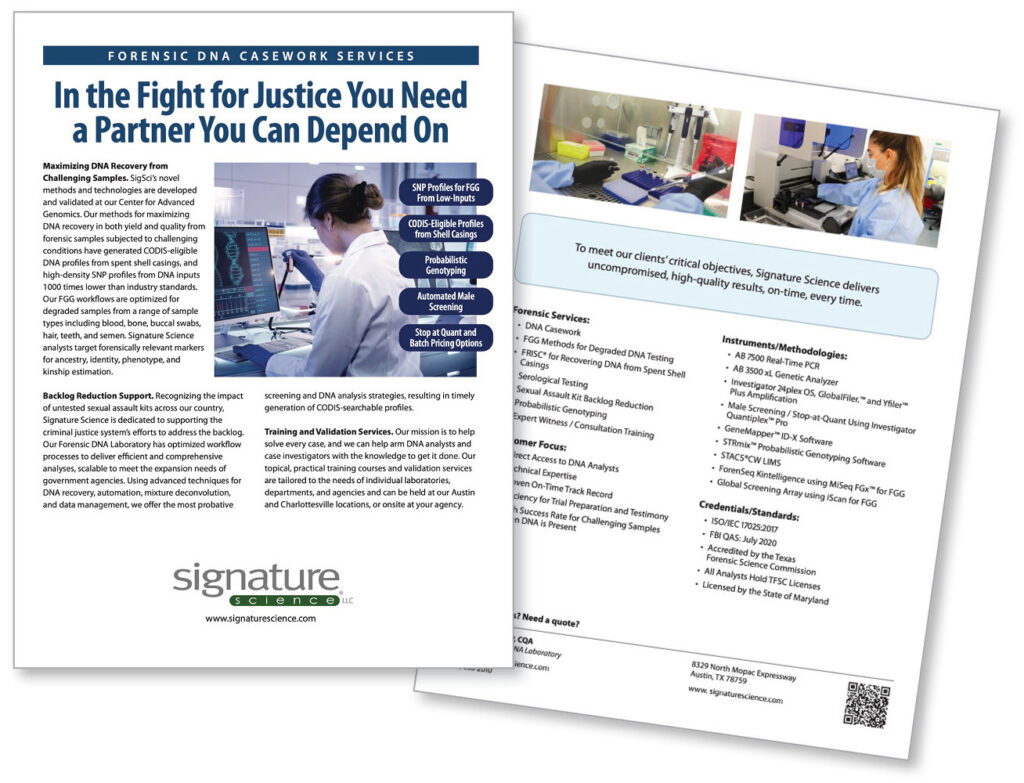Signature Science supports your investigative efforts by providing cost-effective, scalable casework solutions for both traditional and specialized sample analysis. Because we, too, want to solve every case, our experts from the Center for Advanced Genomics® engage in high-level genomic research, development, and testing and evaluation to address the scientific and technical forensic challenges facing our criminal justice system.

Forensic DNA Casework
State and local law enforcement crime laboratories across the U.S. rely on Signature Science’s ANAB-accredited DNA casework laboratory to provide high-quality analysis and training services on time, every time.
Our accredited forensic DNA laboratory and skilled analysts offer
- Extraction and quantification of DNA
- Investigator 24Plex
- GlobalFiler®
- Yfiler® Plus
- Probabilistic genotyping with STRmix™
- Body fluid identification & evidence screening
- Male screening and stop-at-quant testing
- Expert witness testimony & consultations
- Case & data review
- Validated solutions for challenging sample types
- FRISC® (Shell Casing extraction and analysis)
- Forensic Genetic Genealogy
- Global Screening Array using iScan™
- Bone, hair, blood, semen, teeth, buccal swabs
Click to view Accreditation Certificate and Scope.


Forensic Genetic Genealogy (FGG)
Forensic genetic genealogy (FGG) is a different approach to develop investigative leads for your violent crime cold case or active case that has not returned a DNA match in the CODIS database. FGG combines advanced DNA laboratory analysis, called genotyping, which determines differences in an individual’s genetic make-up by examining one’s DNA sequence. Once identified, genotype data is uploaded into public genetic genealogy database(s) to search for familial links. Genetic genealogy researchers use the familial link to identify investigative leads to potential suspect(s). The resulting genealogy research is delivered to the case investigator for lead follow up.
At the CAG, we perform the DNA genotyping in our own lab – we do not outsource this crucial first step! Why? Because where others may see a dead end, our forensic scientists use their expertise to get the best DNA genotype profiles possible from the worst samples imaginable. Our validated lab methods can provide investigative leads from DNA inputs 1000x lower than industry standards, giving you the best shot at solving your case. The quantity and quality of your DNA sample determines your testing options. Our team can recommend which of your case samples are best for genotyping and which method has the greatest chance for success.
The CAG Has a Validated Method to Help Solve Your Case
Not sure where to start? Reach out and share the details of your case with us.
FGG Services FAQ
What is the FGG Case Review Process?
Our CAG team, made up of forensic scientists, bioinformaticians/data scientists, and genealogists, works closely with law enforcement clients to determine if their case samples are suitable for genotyping and compliant with the current U.S. Department of Justice policy on FGG DNA analysis and searching. Criteria include, but are not limited to:
- Case involves an unsolved violent crime, and the candidate forensic sample is from a putative perpetrator, or unidentified remains of a suspected homicide victim (‘unidentified human remains’).
- The forensic profile derived from the candidate forensic sample must have been uploaded to CODIS, and subsequent CODIS searches must have failed to produce a probative and confirmed DNA match.
A checklist containing all the minimum requirements for the candidate samples will be provided as part of the initial request for candidate sample submission for FGG. Case review will conclude with a conference (via video or telephone) between SigSci and a designee to report the conclusions of the review and to determine and authorize the final workflow on a case-by-case basis.
The current DNA input requirements are ≥ 0.05 ng/µL in a minimum volume of 10 µL for GSA and 0.04 ng/µL in up to 25 µL for Kintelligence. We currently require samples to be single source but there are some exceptions that depend upon the ratio of major to minor donor in the sample.
How are samples quantified and processed?
Candidate sample(s) (items and/or extracts) submitted for FGG are extracted (if necessary) and first quantified using the Investigator® Quantiplex® Pro Kit to ensure sufficient quantity and quality are present for genotyping. Depending upon quantity and quality and thorough discussion with Law Enforcment, the forensic scientists will help guide the best FGG service (GSA or Kintelligence) to use to obtain the best results for your sample(s).
The Infinium Global Screening Array is a genome wide genotyping method that provides ancestry, identity, and phenotype (hair/eye color) markers along with extended kinship markers. This method allows for higher sample throughput while maintaining low DNA input requirements.
Kintelligence, an integrated forensic genetic genealogy (FGG) solution based on next-generation sequencing technology, targets forensically relevant markers along with ancestry, identity, and phenotype (hair/eye color) markers to estimate kinship.
Each is optimized for degraded and low-input DNA samples from a range of sample types including blood, bone, buccal swabs, hair, teeth, semen, and touch DNA (e.g., tape and spent shell casings). Further, the CAG has genotyped cremains and burned and surface-decomposed bone indicating the ForenSeq Kintelligence performs well with highly degraded remains, which can sometimes be challenging for array methods.
Will FGG work for low-input or degraded samples?
The CAG’s developmental validation of the Illumina GSA demonstrated successful genotyping with DNA input levels down to 0.2 ng, three orders of magnitude lower than the manufacturer’s recommended input of 200 ng.
Our GSA method is optimized for challenging and low-input DNA samples from a range of sample types including blood, bone, buccal swabs, hair, teeth, semen, and touch DNA (e.g., tape and spent shell casings).
Similarly, our Kintelligence method is optimized for degraded and low-input DNA samples from a range of sample types including blood, bone, buccal swabs, hair, teeth, and semen. Successful genotyping, eligible for GEDmatch Pro upload, has also been shown from degraded samples (e.g., bone) with various insults including cremation, embalming, and surface decomposition.
How will data be analyzed and uploaded to reference databases?
Microarray data are visualized and analyzed using Illumina’s GenomeStudio® software. The data generated undergo rigorous quality assessment, followed by data preparation and upload into GEDmatch for finding genetic relatives. Formatted data are uploaded into FamilyTreeDNA on a case-by-case basis. Additionally, upon request, data can be analyzed to provide phenotypic information such as biogeographic ancestry and hair, eye, and skin color.
Kintelligence workflow data analysis component is performed with the Verogen ForenSeq Universal Analysis Software, and long‑range kinship estimation in GEDmatch Pro informs the construction of a family tree.
How are investigative leads generated?
Genetic genealogy research is performed on the DNA data output file(s) from the genealogical database(s) with the goal of generating leads for our law enforcement clients. Through this process, leads such as ethnicity composition, surnames, familial geographic locations, and DNA relatives may be reported. Each individual piece of information collected is considered a lead and is reported to our law enforcement client.
Are there third party funding options for my case?
In the interest of solving more violent crimes, several organizations and nonprofits provide grant funding to law enforcement for Forensic Genetic Genealogy (FGG) services. These funds can help subsidize the costs of advanced DNA testing methods, and help your agency solve its toughest cases.
Looking to apply for grant funding? Start your search:
Bureau of Justice Administration
Season of Justice
Missing and Unidentified Human Remains (MUHR) Program
Emmett Till Cold Case Investigations and Prosecution Program
Application windows and case criteria vary. Signature Science is not directly affiliated with any third-party funding company.


Leslie Parke, PMP, CQA
Director, Forensic DNA Laboratory
For more information about Forensic DNA Casework
Christina Neal, MS, PMP
CAG Laboratory Manager
For more information about Forensic Genetic Genealogy
Training and Validation Services
Our mission is to help solve every case, and we can help arm DNA analysts and case investigators with the knowledge to get it done. Our topical, practical training courses and validation services are tailored to the needs of individual laboratories, departments, and agencies and can be held at our Austin and Charlottesville locations, or onsite at your agency.
Selected Training Topics:
- General and STRmix™ Expert Witness Testimony
- DNA on Items of Evidence (What to Collect, Best Items to Send in for Testing
- Understanding Serology and DNA Reports
- Enhanced Workflows
- Forenseq Kintelligence
- Whole Genome Sequencing
- Targeted Sequencing
- Array Genotyping
Selected Validation Services:
- Enhanced Laboratory Workflow Set Up (e.g., ForenSeq Kintelligence)
- Workflow Validation Support
- Validation Planning
- Validation Execution
- Data Analysis
- Validation Report Writing
- SOP Development

For more information about Training and Validation Services:
SUBSCRIBE to Our Newsletter
Get the latest Center for Advanced Genomics news every quarter.


